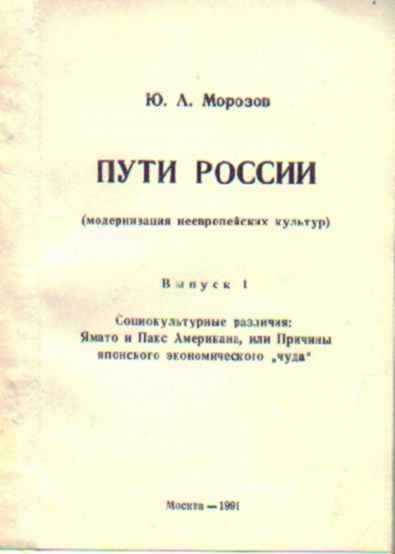While dealing with the causes of the so called "Japanese Miracle" in the middle of the 70-s I asked myself a question: "Why don't we, Russians, have our Miracle? What prevents us -- as well as many other countries in the world now and in the pastŚfrom modernization?"
My first report and presentation on the probable reasons of the lack of incentives for modernization outside of the West and probable solutions was done in 1979; by the fall of 1982 I prepared the first version of the book
A Russian Way
(modernization of non-Western cultures)
published in Moscow in 1991-1992, vv. 1-).

The book is based on my own experiments, tests, interviews, discussions, that I had during lectures, seminars, business games, case studies, meetings with managers and scientists from various cultures, and on my own observations in the process of sensitivity trainings and NLP sessions.
The main conclusions:
1. Socium/society is composed from several Socio-cultural Entities (SCE -- or simply cultures), which have different goals, values, norms, traditions, attitudes towards life, man and mankind, labour, future, time, production, profit.
2. One of such SCEŚEast-European culture (or: "Orthodox Christina Culture," in the text I call it also "Russian Culture"), which includes Russians, Ukrainians, Byelorussians, Bulgarians, Serbs and some other nations.
3. That what we call "economy" and "democracy" was generated by a specific cultureŚWest-European Culture, and reflects is unique features, that cannot be copied/adopted by any other culture without changing itself drastically.
4. Japan (as well as other countries, belonging to another big cultureŚFar-Eastern: China, Korea, Vietnam, Singapore, Taiwan) succeeded precisely because they did not COPY the West, but created its own system (worst of all, Japan was absolutely unsuccessful while mimicking the USA!)
5. Without taking socio-cultural parameters into the consideration "modernization" of Russia (that is introduction of the market and democracy) is absolutely useless and, probably, dangerous.
Immediate practical applications:
- "simple" straightforward nationalization in Russia will result in seizure of all means of production by a small group and in decrease of productivity;
- according to Russian traditions we need a fair distribution of the nation's wealth, as it was created by everybody, not only bureaucrats, criminals and partocrats;
- "simple" straightforward democratization will result in a new oligarch structureŚirrespective to whose clans/families will be represented thereŚCommunist Party Úlite or "new Úlite."
- to modernize we in Russia need a new regulatory system, based on our own cultural traditions.
However, this book could not be published in the Soviet Union; strange as it seems, but even after "perestrojka" the situation was the same; and Western publishing houses also did not want to publish its English version.
My translation of its outline: